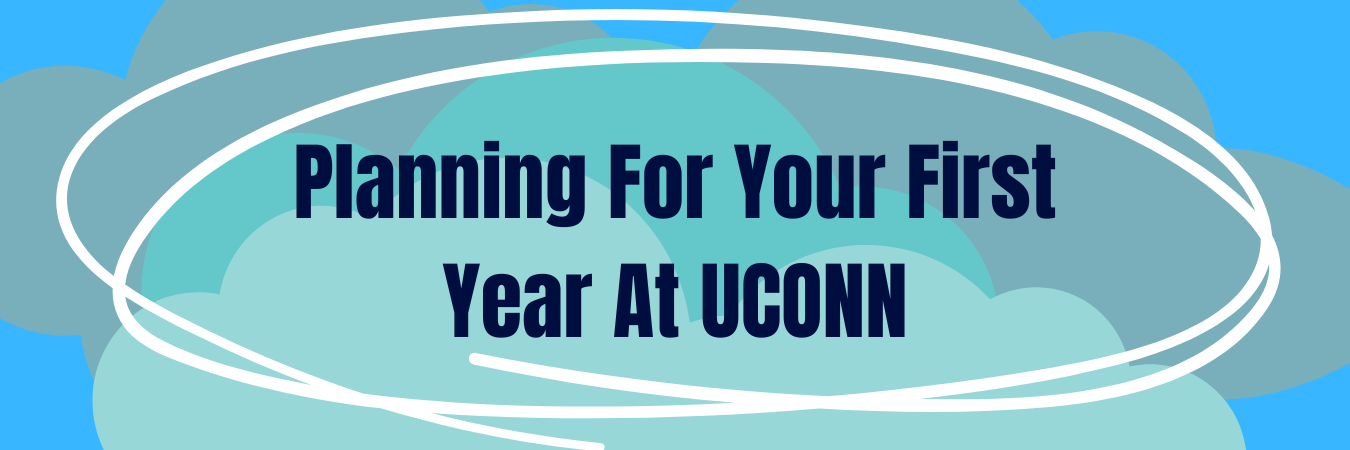
In some sense, the last twelve years of hard academic work have culminated in this moment. You applied yourself and succeeded from K – 12, underwent a trying college application process, and made the (wonderful) choice to attend the University of Connecticut. Yet now a new journey begins, and with it comes new and rewarding challenges. Please use the following resources to assist you with the transition to college at the University of Connecticut and to engage with the academic, social, and cultural dimensions of the university early in your academic careers.
Before Arriving at UConn
To Do list
- Download the MyUConn app, to obtain campus transportation information and a lot more!
- Make sure you are enrolled in an First Year Experience (UNIV 1800, 1810, or 1820) section.
- Start planning which Week-of-Welcome events you want to attend.
- Mark your calendar for The Involvement Fair, which occurs the second Wednesday of every fall and spring semester.
- Review suggestions and even more suggestions for what to bring to college.
- Contact your roommate, but first, get some tips on how to best communicate.
- Download google apps, which gives you access to your UConn calendar, drive, and more.
- Read an article or two from our "Transition" section.
Campus Offices to Know
Dean of Students Office - collaborates with a number of campus constituents to maintain a positive learning environment. DOS can help with finals rescheduling, extension of incomplete grades, short term emergency loans, victim support, and more.
Dining Services - provides meal plan information
Office of the Registrar - creates and manages academic records, registers students, processes grades, issues transcripts, certifies students, maintains the Student Advisement system, and audits degrees.
Residential Life - provides information on housing options and allows you to apply for housing. They also provide an Items to Bring list.
Information Center - located on second floor of the Student Union by the Fairfield Way entrance. The Information Center is a hub for questions, directions, maps, and anything a visitor needs to know about the University of Connecticut. If you have a question or concern, we will happily assist with finding the answer, or pointing you in the right direction.
Student Transition
Resources
Article - 50 Tips for College Freshmen – Making the Most of Your First Year
Article - Conquering the Freshman Fear of Failure
Article - Freshmen Year Sucks - and That's Okay
Article - The Power of Realistic Expectations
Reflection Questions:
- What expectations do you have of college and from where did they come? (e.g. TV, movies, friends, parents, Orientation)
- Each student’s transition experience is unique. For you, what do you think will be the biggest challenge this semester?
First Weeks at UConn
What resources should you know and what you don't want to miss.
Campus Resources
The Involvement Fair - occurs the second Wednesday of every fall and spring semester. Also download the Ultimate Guide to Getting Involved from their website.
HuskyCT - HuskyCT, which stands for “Husky Course Tools,” is UConn’s name for our learning management system. Instructors may use a HuskyCT site to post course materials, online assignments, discussion forums, tests, and grades.
MyUConn app - Keep up-to-date on everything UConn.
First Year Acronym Glossary - Learn about the different acronyms used for offices, organizations, and cultural centers at UConn and where they are located.
Academic Success at UConn 101
Many high school scholars enter their college career as “passive learners who possess rote-level strategies for learning” that may have worked in high school, but make learning and studying much more difficult at the college level (Simpson and Nist, 2000). One of the most important, overarching difference between high school and college it that here, you are expected to be in charge of your own learning. As an adult learner your professors require you to treat your education as a job and a privilege.
Campus Resources
Academic Achievement Center - offers different expert-led FYE presentations for you to choose from, including study skills, time management, exam preparation, and stress management. You can also get one-on-one skills coaching from one of their peer coaches.
Quantitative Learning "Q" Center - is a resource to elevate the proficiency of students taking quantitative intensive (Q) courses across the undergraduate curriculum.
The Writing Center - offers writing support from trained tutors at any point in your drafting and editing process.
Center for Students with Disabilities - engages in an interactive process with each student and reviews requests for accommodations on an individualized, case-by-case basis.
UConn Connects - serves as an intervention program to help struggling students be more successful by pairing individual students with a faculty, staff, or peer facilitator who supports them throughout the semester.
Other Resources
Article - How to Talk to a Professor - Explained by a Professor
Challenge - Go to the office hours of every one of your professors and TAs at least once before the end of the semester. Be sure to come prepared with thoughtful questions, but be willing to get to know them informally on a personal level as well.
Reflection Questions:
- How many study methods do you already use? What are two new strategies you would like to try this semester?
- What kind of atmosphere (physical space) is best for you as a learner? What are two places you can find like that on campus?
- What is your greatest challenge when it comes to strategic learning – time management, procrastination, learning certain types of content, etc.? Who on campus can help you succeed?
- What is the hardest part of practicing critical and creative thinking, from your perspective?
- What is one thing you can do to help yourself practice critical and creative thinking more often?
- How would the world be different if everyone committed to practicing critical and creative thinking as often as possible?
Critical Thinking, Self Awareness, and Moving Outside of Your Comfort Zone
Critical and creative thinking are vital to not only your college experience, but also to your opportunities as an adult. In the past you may have associated these skills only with academic work, but the same strategies will benefit you in the entirety of your college experience and beyond. Included in this is the challenge for you to think critically about what you know (and don't know), what you're experiencing (and not experiencing), and how you're doing things. Keep pushing yourself to move outside of your comfort zone, because that's where the real learning occurs.
Other Resources
Video - The Power of Vulnerability with Brene Brown
Major and Early Career Planning
Whether you are confident about your major and future career, the same life plan you’ve had since age three, or you aren’t even sure which class you might want to take next semester now is the best time to explore your major and career opportunities.
Campus Resources
Academic Center for Exploratory Students (ACES) - is UConn’s academic advising program for students who have yet to declare a major.
Center for Career Development - support the intellectual growth of our students by providing programs and experiences that promote self-awareness and engagement as they identify a course of study and pursue opportunities to become contributing members of the state, national, and world communities.
The Major Experience - is a University-wide collaboration designed to help students explore majors in a holistic, interactive, and intentional manner. TME facilitates peer-to-peer connections, faculty-student networking, workshops, and more.
UNIV 1820 courses - If you are unsure of your major, you want see what you might learn in a major, or you’re just really excited to begin taking small, hands-on seminars in your area of interest consider taking a UNIV 1820 course.
Other Resources
How to... - How to Choose a College Major & Minor
Article - 5 Skills College Grads Need to Get a Job
Article - 10 Soft Skills You Should Have by Graduation and How to Master Them
Article - Are You As Freaked Out About Life After College As I Am?
Article - Hey, Students: 5 Things That Are Wrong With Your Cover Letter
Article - New College Grads: Who Employers Want to Hire
Article - Nonacademic Skills Are Key To Success. But What Should We Call Them?
Article - The Princeton Review's Guide to Choosing College Majors
Reflection Questions
- What are your three greatest strengths and weaknesses? This is one of the most common first interview questions. How would you answer a potential employer who asked?
- What do you want your life to be like in five years? What about in ten years? Do you know if your chosen career path will help you to build this lifestyle or to make it more difficult to attain? Who can you ask to learn about what it’s really like to be in the field?
- What is one skill you would like to develop while in college?
- How can you get involved beyond the classroom to build your abilities and to demonstrate your competency?
Time Management
Up to this point, many students have had daily schedules that were dictated to them. This isn't the case at university. We know this and we are ready to assist you as you start setting priorities and taking over responsibility for managing your time.
Campus Resources
Academic Achievement Center - has tons of resources and workshops available addressing time management.
Other Resources
Activity - Assignment Calculator
Video - Inside the Mind of a Procrastinator with Ted Urban
Video - How to Stop Procrastination
Article - Procrastination? I'll Get Back to You
Goal Setting
At UConn, your success is in your hands, and you will get as much out of your education as you personally invest. With that comes the responsibility and challenge to develop your own set of expectations and goals to keep yourself motivated and progressing toward your degree.
Resources
Article - A Student Guide to Setting Long-Term Goals
Article - Successful Students Have Goals
Video - How a Student Changed Her Study Habits by Setting Goals and Managing Time
Video - Why You Should Define Your Fears Instead of Your Goals
Activity - Student Goal Setting Template
Reflection Questions:
- Goal setting and motivation in college depends on your definition of success. How might your definition change your goals or motivation?
- If you could do ONE thing this week to set yourself up for success what would it be? Make that a goal, and share it with a friend who will keep you accountable.
- Why are you attending college?
- What is one small thing you can do every week to keep yourself motivated?
- What is the most important thing you want out of your college experience?
Health, Wellness, & Safety
Being a healthy college student is no longer only focused on not gaining the dreaded Freshman-15. Student’s health, wellness and safety focuses on all aspects of the student: from physical to emotional to even mental health. So no matter what happens in your life, we want to make sure you have the information and resources you need to feel safe, healthy, and respected on campus. Whether this is minor test anxiety or a major life emergency, there are knowledgeable, caring professionals on campus ready to listen and help.
Campus Resources
Counseling and Mental Health Services - provides clinical services to promote the emotional, relational, and academic potential of all students.
Wellness and Prevention Services - offers information and support in the areas that include alcohol and other drugs, sexual health, and stress management.
UConn Police - The UConn Police Department is located on North Eagleville Road. The calls for emergency services are answered 24 hours a day, seven days a week.
Women's Center/Violence Against Women Prevention Program - works to break down gender stereotypes and to address institutional sexism, racism, and other forms of oppression.
Other Resources
Video - How to Make Stress Your Friend w/Kelly McGonigal
Video - The Effect of Soda on Your Body
Video - The Power of Vulnerability with Brene Brown
Challenge - Choose one thing you can do every week for the rest of the semester to stay healthy. Keep a log and track your success in accomplishing the goal.
Campus Involvement
The National Survey of Student Engagement (NSSE) data have shown the more that students are involved on campus, the more likely they will stay enrolled at the institution and earn better grades (Kuh, Cruce, Shoup, Kinizie, & Gonyea, 2008). So campus involvement isn’t only fun, but has been shown to increase academic success and to make you more marketable after graduation. When you think critically about how you spend time outside of the classroom during your college career, you can truly make the most of your college experience.
Campus Resources
The Involvement Fair - occurs the second Wednesday of every fall and spring semester. Also download the Ultimate Guide to Getting Involved from their website.
The William Benton Museum of Art - is Connecticut’s State art museum, located on the University of Connecticut campus at Storrs.
Student Activities' Leadership Office - offers discovery and leadership workshops, as well as a ten-week program introducing students to leadership opportunities at UConn
Undergraduate Student Government (USG)
UConntact - is UConn’s searchable Student Organization hub, with a listing of upcoming events for student organizations.
Other Resources
Activity - Go to the Involvement Fair
Reflection Questions:
- What strengths and skills do you already have to contribute to a campus group? How might participation help you build upon them?
- What skills do you want to develop before you graduate from college? What types of involvement opportunities would give you the chance to grow in these areas?
- When adding involvement opportunities to your life you need to be realistic. What days and times work best for your schedule? And how many hours a week do you want to devote to your involvement in this group?
- Challenge: Get involved with something that interests you and fits into your schedule, but that’s different from anything you have done in the past.
Cultural Competency
To thrive in our globalized world cultural competency, the ability to cooperate with people from diverse backgrounds and cultures, is a must.
Campus Resources
The African American Cultural Center - promotes cultural preservation, leadership development, academic excellence, and intercultural communication through programs and activities that are designed to give students an appreciation and an understanding of the heritage and cultural experiences of African Americans and people of African descent in the United States and throughout the world.
The Asian American Cultural Center - provides resources to enhance the University's diversity commitment through its recruitment and retention efforts, teaching, service, and outreach to the Asian American community on campus and beyond.
Education Abroad - offers over 300 study abroad programs in 65 countries on six continents.
Puerto Rican/Latin American Cultural Center - works independently and collaboratively with other University departments and community organizations to sponsor educational and cultural programs, provide services and leadership opportunities, foster connections, and educate the greater University community about Latino issues.
The Rainbow Center - serves UConn’s diverse community of gender identities, gender expressions and sexualities by fostering student personal growth, leadership development, and community engagement; and providing resources, services, education, training and advocacy.
Other Resources
Activity - DEI Menu
Reflection Questions:
- How do you define diversity?
- What is one aspect of your cultural background of which you’re especially proud?
- What is a cultural blind spot for you (something you recognize you don’t understand about another culture that you should learn)? What’s a respectful way you can begin to learn more?
- What is one way you can feel connected to your cultural/ethnic/spiritual background while you’re at college?
- What is one way you can stretch yourself this semester to become more culturally competent?
UConn Traditions
Traditions the world over serve to bring us together as people, bind us together as communities, and create continuity across time. From the UConn Dairy Bar, to receiving good luck by rubbing Jonathan’s nose, to playing in the Oozeball tournament, there are plenty of ways for you to be a part of UConn’s Traditions. These traditions are some of the fun college experiences that bind us all together as Huskies and create great memories that will last a lifetime. Don’t wait until your senior year to start enjoying all of the great experiences you can have as a UConn Husky!
Campus Resources
- Activity - FYE Jeopardy Game & Answer Sheet
- Eat some ice cream at the UConn Dairy Bar - The UConn Dairy Bar opened in 1953 to sell dairy products that were made by the Creamery. The Creamery was established in the early 1900s and bottled milk all the way up until 1991. Today, the Creamery makes ice cream according to its original recipe and sells this ice cream through the Dairy Bar retail establishment, along with a variety of cheeses.
- Network using UConn Alumni Relations - UConn has over 233,000 alumni worldwide. Through the network you can meet alumni who can help make your internship or career search easier, talk with you about the latest news in your field of interest, assist you with informational interviews and site visits, and advise you on living in a new place after graduation.
- Rub Jonathan the Husky Dog statue's nose.
Financial Literacy
We know that planning for your financial future is probably not yet at the top of your to-do list, but whether or not you realize it, you are already making important financial decisions that will influence your life long after you graduate.
Campus Resources
Bursar's Office - manages key University financial resources and records, provides guidance towards establishing appropriate fiscal practices, and acts as a central collection point for University receipts.
Office of Student Financial Aid Services - disburses grants and scholarships, as well as provides other financial assistance. They have:
- A Net Price calculator
- A chart of estimated cost to attend UConn
- and a whole lot more
Other Resources
A Guide to College Student Finances
US Consumer Protection Bureau - Information for Students and Young Consumers
Reflection Questions:
- How do you plan to pay for college? If taking out student loans, how much money are you comfortable taking out (subsidized or unsubsidized)?
- How much time are you going to be willing and able to work while in school? And how much am I likely to earn?
- What kinds of experiences do you want to save money or apply for scholarships/grants to have during your time in college (study abroad, community service trips, etc.)?
- Do you have a college budget? If not, should you develop one? How much money can you spend each week/semester/year?
- At this point in the semester how much money have you wasted in missing classes? How do you feel about that number?
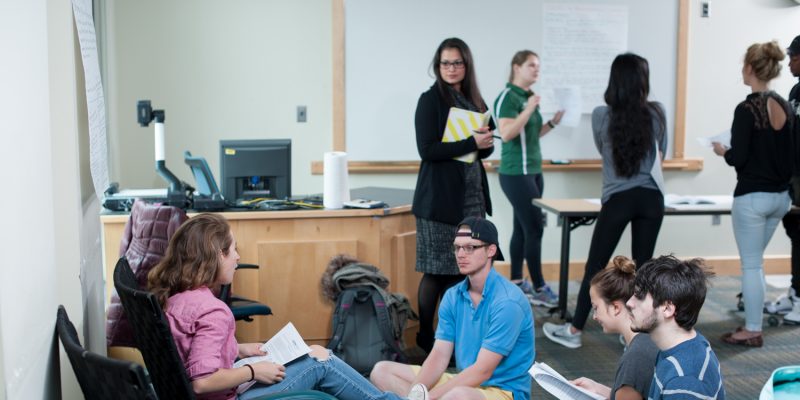
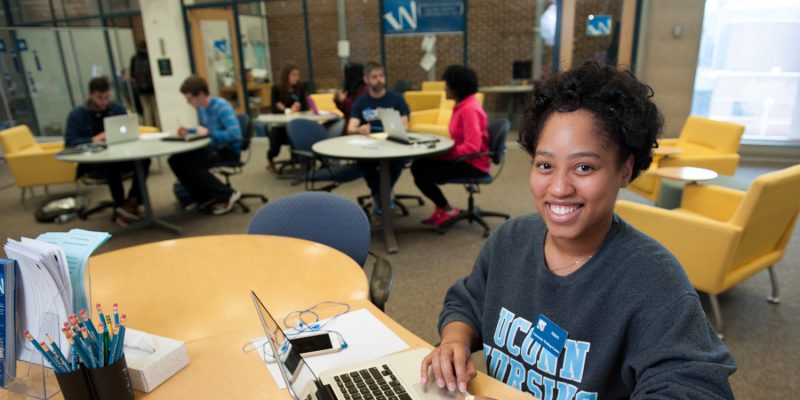 The Writing Center
The Writing Center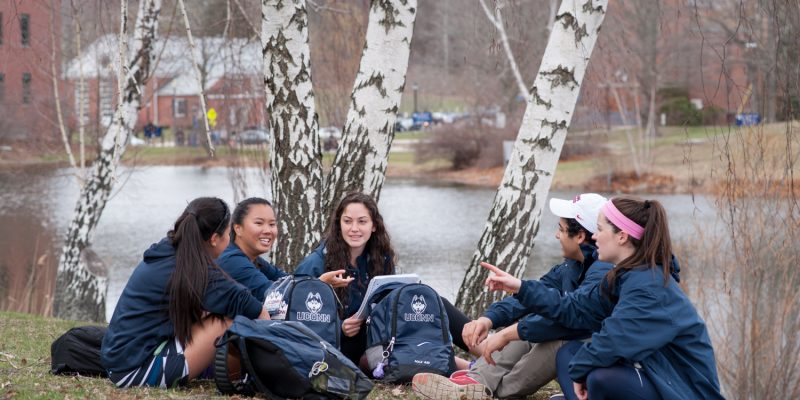 Meeting at Swan Lake
Meeting at Swan Lake Studying at the Beanery
Studying at the Beanery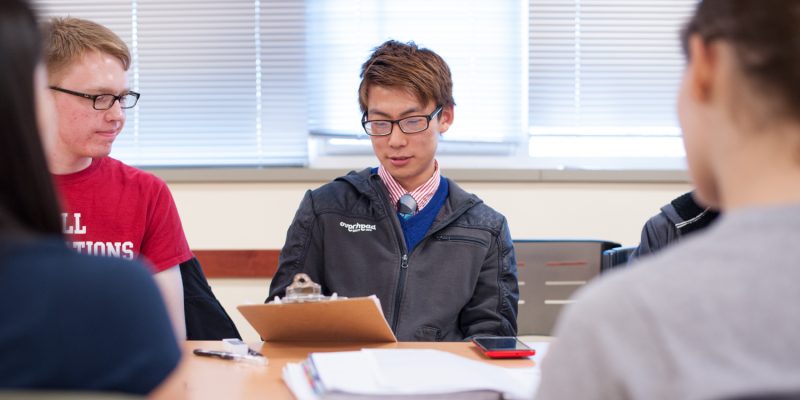
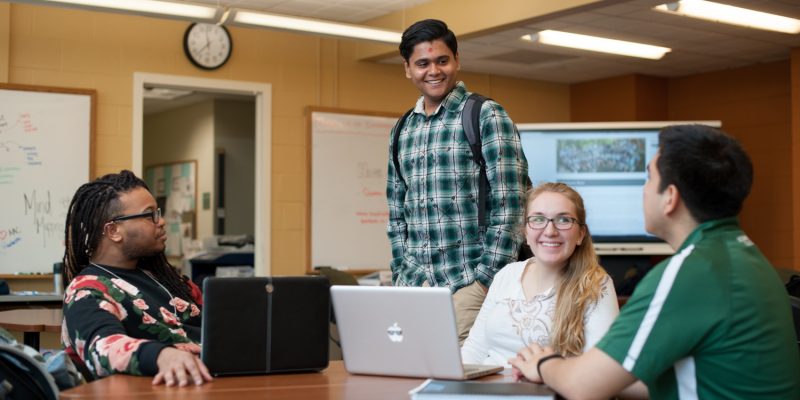 Academic Achievement Center
Academic Achievement Center